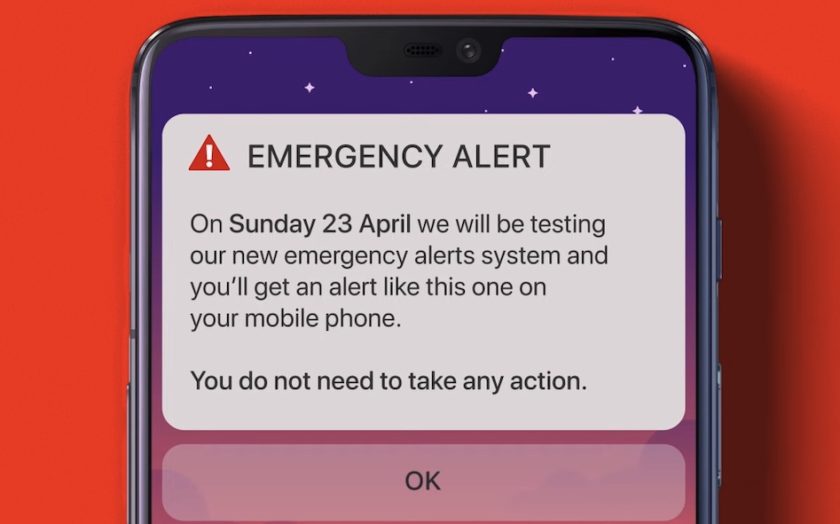Updated: “Keep Calm and Carry On: This is just a test”

Update: Mobile phones across the UK have received the first emergency alert as part of a UK-wide test.
For some, the alert arrived a minute or two earlier than the stated 3pm time.
Reports on social media claim some people have not received the alert.
The BBC has said: “Some colleagues here in the newsroom are yet to receive any alert on their phones.”
Earlier report: The UK is set to conduct its first-ever nationwide test of the emergency alert system on Sunday, April 23rd.
Officials from the Cabinet Office National Situation Centre will send out the alert at 3 pm, which will be received by every 4G and 5G device across the United Kingdom.
The system is an additional tool in the national resilience toolkit and will be used in times of an imminent risk to life, such as during flooding or wildfires.
A major awareness campaign was launched to ensure that the public is aware of the test of the system. According to new polling, 88% of the British public is now aware.
Announcements and signage across the transport network will be in place in the run-up to the test, and the alert will be a siren-like sound no more prominent than the loudest ringtone setting on a mobile phone.
People are being urged to remember that this is just a test, akin to a one-off fire alarm drill, and no action is required when they receive the test alert.
The test will be sent using mobile broadcasting technology which uses cell towers rather than SMS.
The test is secure, free to receive and one-way, and does not reveal anyone’s location or collect personal data.
The sound and vibration of the test alert will stop automatically after ten seconds.
All people need to do is swipe away the message or click ‘OK’ on their phone’s home screen – just like for a ‘low battery’ warning or notification – and continue to use their phone as normal.
The test message will say:
This is a test of Emergency Alerts, a new UK government service that will warn you if there’s a life-threatening emergency nearby.
In a real emergency, follow the instructions in the alert to keep yourself and others safe.
Visit gov.uk/alerts for more information.
This is a test. You do not need to take any action.
The UK government said that “‘Best practice of Emergency Alerts in other countries have shown that they work more effectively when there is a real emergency if people have previously received a test, so they know what an alert looks and sounds like.”
Emergency Alerts have already been used successfully in a number of countries, including the US, Canada and Japan, where the system has been widely credited with saving lives, for example, during severe weather events.
In the UK, alerts could be used to inform people about wildfires or severe flooding.
Chief Fire Officer for Hertfordshire, and Resilience Lead on the National Fire Chiefs Council, Alex Woodman, said:
“Whilst today’s ten second national test may be inconvenient for some, please forgive the intrusion, because the next time you hear the alert, your life and the lifesaving actions of our emergency services could depend on it.”
“We must use every tool at our disposal to keep people safe and we need everyone to play their part. The new Emergency Alerts system is one way we can do this.”
National Police Chiefs’ Council Lead for Civil Contingencies, Assistant Chief Constable Owen Weatherill said:
“During times of crises, it’s vital to warn and inform the public at speed. We look forward to further developing the use of the Emergency Alerts capability and the way it can protect and preserve life, as well as supporting policing’s wider response to critical incidents with partner agencies.”
“Alongside partners, we will continue to listen carefully to public feedback and ensure the use of Emergency Alerts has a positive impact.”
The Cabinet Office said: “Emergency Alerts will transform the UK’s warning and informing capability; working with mobile broadcasting technology provides a means to get urgent messages quickly to nearly 90 percent of mobile phones in a defined area when there is a risk to life, and provide clear instructions about how best to respond.”
“The system will be used very rarely – only being sent where there is an immediate risk to people’s lives – so people may not receive an alert for months or years, if at all.”
Domestic violence charities have expressed concern that the message and loud alarm may alert abusers to secret phones that some people experiencing violence in the home may have hidden.
Detials on how to stop the alert going off:
To turn off the Emergency Alert system for Apple and Android phones, please see the below instructions.
Steps for Android users:
- Go to the settings app of the Android device
- Search for ‘Emergency Alerts’ using the search bar at the top of the screen
- Click or tap on the first option that pops up
- Once in the device’s Emergency Alerts settings page, turn off Emergency Alerts by pressing all the toggle buttons (blue means on, grey means off)
Steps for Apple users:
- Go to the settings app of the Apple device
- Scroll down to find and click or tap on the ‘Notifications’ tab
- Scroll all the way down again to find a dedicated section for Emergency Alerts
- You will see ‘Extreme Alerts’ and ‘Severe Alerts’ buttons, but this sometimes varies depending on which iPhone or Apple device you are using.
- To turn them off, press all the toggle buttons (blue means on, grey means off)
Spotted something? Got a story? Email: [email protected]
Latest News
